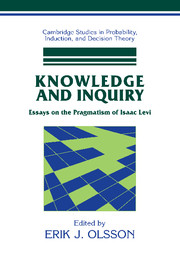Book contents
- Frontmatter
- Contents
- List of Contributors
- Preface
- Introduction: The Pragmatism of Isaac Levi
- 1 Isaac Levi and His Pragmatist Lineage
- 2 Is Pragmatist Truth Irrelevant to Inquiry?
- 3 The Knowledge Business
- 4 Infallibility and Incorrigibility
- 5 Why Inconsistency Is Not Hell: Making Room for Inconsistency in Science
- 6 Levi on Risk
- 7 Vexed Convexity
- 8 Levi's Chances
- 9 Isaac Levi's Potentially Surprising Epistemological Picture
- 10 Isaac Levi on Abduction
- 11 Potential Answers – To What Question?
- 12 Levi and the Lottery
- 13 The Value of Truth and the Value of Information: On Isaac Levi's Epistemology
- 14 Decision-Theoretic Contraction and Sequential Change
- 15 Deciding What You Know
- 16 Levi's Ideals
- 17 The Mind We do Not Change
- 18 Psychoanalysis as Technology
- 19 Levi on Money Pumps and Diachronic Dutch Books
- 20 Levi on the Reality of Dispositions
- 21 Replies
- Index
- References
9 - Isaac Levi's Potentially Surprising Epistemological Picture
Published online by Cambridge University Press: 05 March 2010
- Frontmatter
- Contents
- List of Contributors
- Preface
- Introduction: The Pragmatism of Isaac Levi
- 1 Isaac Levi and His Pragmatist Lineage
- 2 Is Pragmatist Truth Irrelevant to Inquiry?
- 3 The Knowledge Business
- 4 Infallibility and Incorrigibility
- 5 Why Inconsistency Is Not Hell: Making Room for Inconsistency in Science
- 6 Levi on Risk
- 7 Vexed Convexity
- 8 Levi's Chances
- 9 Isaac Levi's Potentially Surprising Epistemological Picture
- 10 Isaac Levi on Abduction
- 11 Potential Answers – To What Question?
- 12 Levi and the Lottery
- 13 The Value of Truth and the Value of Information: On Isaac Levi's Epistemology
- 14 Decision-Theoretic Contraction and Sequential Change
- 15 Deciding What You Know
- 16 Levi's Ideals
- 17 The Mind We do Not Change
- 18 Psychoanalysis as Technology
- 19 Levi on Money Pumps and Diachronic Dutch Books
- 20 Levi on the Reality of Dispositions
- 21 Replies
- Index
- References
Summary
A BRIEF LOOK FORTY YEARS BACK
I certainly have no doubt about how much Isaac Levi has taught us in epistemological matters. Yet not for the first time I wonder at how philosophers can be so close and so different at the same time. The better the comparability, I assume, the sharper the comparison. Hence, this paper is devoted to a brief comparison of Levi's epistemological picture and mine. It mainly stays on an informal level, aiming at the basic features. The intention is not a critical one. It is rather to promote mutual understanding, because the similarities and differences are not easy to grasp.
Current discussions in formal epistemology tend to be quite specialized, building on rich but not well reflected presuppositions. So, a brief look at its history may be healthy. It is indeed necessary for understanding Levi's role and position.
The history of formal epistemology is predominantly that of probability theory. Mathematical probability was the only clear structure that emerged through the centuries. Not that there would have been no alternatives at all. There are various ideas, perhaps subsumable under the heading “Baconian probability,” which hung around for centuries as well. But they never took a clear and determinate shape, and thus probability theory could develop its unrivaled power, culminating, as far as its philosophical use is concerned, in the work of Frank Ramsey, Bruno de Finetti, Leonard Savage, Rudolf Carnap, and others.
- Type
- Chapter
- Information
- Knowledge and InquiryEssays on the Pragmatism of Isaac Levi, pp. 125 - 142Publisher: Cambridge University PressPrint publication year: 2006
References
- 2
- Cited by



